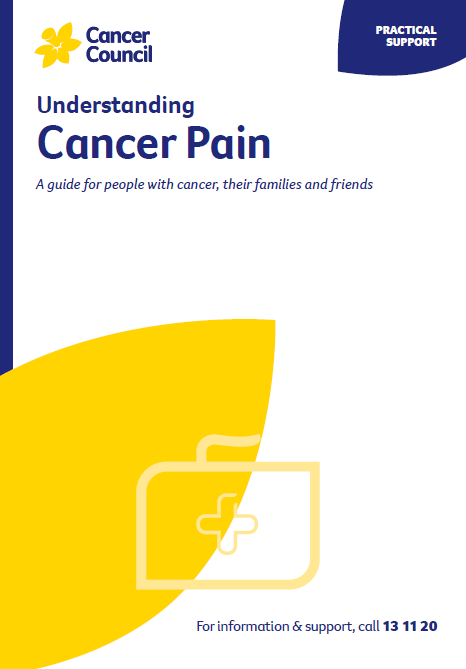Managing pain
Many people with advanced cancer worry they will be in pain, but not everyone has pain. Those who do have pain may not be in pain all the time – it may come and go.
The pain may be caused by the cancer itself or by cancer treatment. For example, the tumour may be blocking an organ or pressing on organs, nerves or bone.
Learn more about:
Ways to relieve pain
If you do experience pain, it can usually be controlled. Pain management is a specialised field, and palliative care teams are trained in finding you the right medicine, dosage and way to take it.
There are many ways to relieve pain, including:
- pain medicines
- pain-relieving procedures for nerve pain
- complementary therapies such as massage, meditation, relaxation, acupuncture or hypnotherapy
- chemotherapy, radiation therapy or surgery.
Everyone experiences pain differently, so it may take time to find the pain relief or combination of treatments that work best for you. Using a pain scale or pain diary can help you describe your pain and how it is affecting you. This will assist your pain specialists to work out the best way to control the pain.
How and where the pain is felt and how it affects your life can change. Regular reviews by pain management experts can usually keep the pain under control.
It’s better to take medicine regularly as prescribed, rather than waiting for the pain to build up. This is called staying on top of the pain. Your doctor will give you instructions on when to take your medicine.
Controlling the pain may allow you to continue with activities you enjoy for some time and offer a better quality of life.
Types of pain medicines
Medicines that relieve pain are called analgesics (also known as pain medicines, pain relievers and painkillers). Some people worry about becoming addicted to pain medicines, but this is unlikely when they are taken palliatively.
Your health care team will monitor you to avoid potential side effects, such as constipation or drowsiness, which can usually be managed.
Depending on the type of pain and how intense it is, you may be offered:
- mild pain medicines, such as paracetamol or non-steroidal anti-inflammatory drugs (NSAIDs)
- moderate pain medicine, such as codeine
- strong pain medicine, such as the opioids morphine, hydromorphone, oxycodone and fentanyl.
Other ways to control pain
Surgery may help to remove or reduce a tumour, or treat blockages causing pain. Chemotherapy may shrink or slow the growth of a tumour. And radiation therapy may also shrink a tumour, and can help relieve pain if cancer has spread to the brain, bones or other organs.
You may have other types of medicine – for example, antidepressants and anticonvulsants for nerve pain; anti-anxiety drugs for muscle spasms; or local anaesthetics for nerve pain.
If the pain is hard to control, a pain specialist may consider a nerve block. The type of nerve block you are offered will vary depending on the type of cancer. Delivering pain medicine directly into the nerves in the spine via a tube (epidural) usually gives short-term relief. Most medicine that can be given by injection can also be connected to a pump.
For more on this, see our general section on Pain and cancer and listen to the podcast below.
Podcast: Managing Pain when Cancer Is Advanced
Listen to more of our podcast for people affected by advanced cancer
Dr Lucy Gately, Medical Oncologist, Alfred Health and Walter and Eliza Institute for Medical Research, VIC; Dr Katherine Allsopp, Supportive and Palliative Care Specialist, Westmead Hospital, NSW; A/Prof Megan Best, The University of Notre Dame Australia and The University of Sydney, NSW; Dr Keiron Bradley, Palliative Care Consultant, Medical Director Palliative Care Program, Bethesda Health Care, WA; Craig Brewer, Consumer; Emeritus Professor Phyllis Butow, Psychologist, The University of Sydney and Chris O’Brien Lifehouse, NSW; Louise Durham, Palliative Care Nurse Practitioner Outpatients, Princess Alexandra Hospital, Metro South Palliative Care, QLD; Dr Roya Merie, Radiation Oncologist, ICON Cancer Centre, Concord, NSW; Penny Neller, Project Coordinator, National Palliative Care Projects, Australian Centre for Health Law Research, Queensland University of Technology, QLD; Caitriona Nienaber, 13 11 20 Consultant, Cancer Council WA; Xanthe Sansome, Program Director, Advance Care Planning Australia, VIC; Sparke Helmore Lawyers; Peter Spolc, Consumer.
View the Cancer Council NSW editorial policy.
View all publications or call 13 11 20 for free printed copies.
